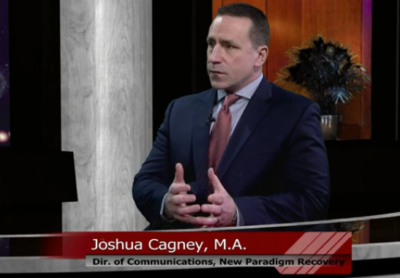New Paradigm Recovery with Joshua Cagney
(March 13, 2019) Catherine Read sits down with Joshua Cagney, Director of Communications, for New Paradigm Recovery (NPR). NPR is an intensive, outpatient rehabilitation program dedicated to changing the lives of men, women, families and communities affected by alcohol and substance abuse disorder. As an outpatient facility, NPR focuses on comprehensive healing of the individual in mind, body and spirit. They also promote best practices in order to achieve life-long recovery from alcohol and narcotics.
The goal of NPR is to maximize their client’s recovery from addiction without compromising their health, happiness or potential for success. They provide an individualized, sustainable therapeutic program of recovery, enabling their clients to overcome the issues that have negatively affected their lives, the lives of their loved ones, and the lives of those in the community surrounding them. NPR empowers their clients and teaches them how to grow through their experiences, rather than despite their challenges.
Cagney talks extensively about the importance of treating the underlying causes that lead people to addiction. He stresses that there is not a one-size-fits-all solution to addiction, because the symptoms are unique for each individual. Until these root causes are addressed, and a plan is put in place so that the underlying problems do not reoccur, the likelihood of slipping back to addiction is very high. NPR approaches the challenge of addiction in a holistic manner, taking into account all of the obstacles and challenges that clients face on a daily basis. Only after an honest accounting of these hurdles takes place, can they begin to address the challenges and put a plan in place to help their clients heal and avoid a relapse.
New Paradigm Recovery is an outpatient facility that offers anywhere from 9-15 hours of counseling on a weekly basis. Although month-long in-patient facilities serve an important purpose to help people detox, Cagney notes that an extended care model is critical for success once people leave an in-patient program. An outpatient facility allows them to learn how to deal with the daily obstacles of re-entry to society, and helps them navigate what can be a very difficult transition.

Cagney also recognizes that law enforcement is not equipped to handle the growing epidemic. As a nation we need to invest in social workers and counselors, who can help addicts understand the problems that they are facing, and work toward recovery. Jail will never be the solution for a drug addict, as it is shown that the recidivism rate amongst addicts is very high. If the goal is for people to re-enter society and be productive and contributing members, then it is imperative to understand that effective treatment and recovery is the only way for that to happen. NPR, and other extended care models, will be integral to helping to solve the crisis we are experiencing today.